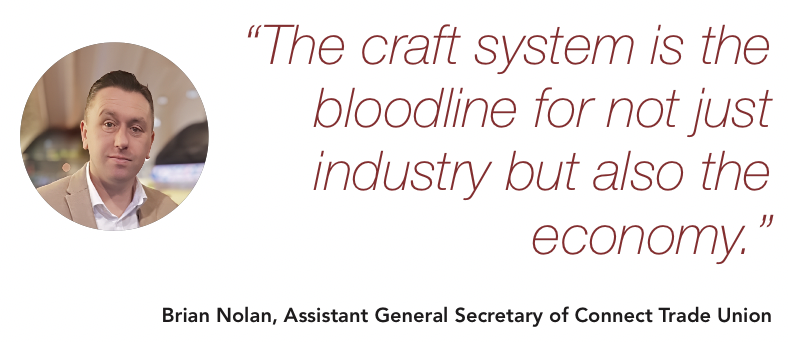TRADE UNION DESK Crafts: The bloodline of the economy

Connect’s new National Craft Apprentices Survey is a first of its kind in that it is driven by apprentices, writes Brian Nolan, Assistant General Secretary of Connect Trade Union.
Connect Trade Union is Ireland’s largest craft union. The craft system is the bloodline for not just industry but also the economy, and while the Department of Further and Higher Education, Research, Innovation and Science may be claiming ‘huge success’ with apprenticeships, there is much to be addressed in order to retain a world-class apprenticeship system.
It has been obvious for some time now that while others have tinkered with the apprenticeship system to the detriment of the world class reputation, there is one voice, one opinion that is being ignored, that of the apprentices.
The National Craft Apprentices Survey will go live and be available to all craft apprentices throughout June, July, and August 2024 so that they might have their say.
The data collected from the survey will be compiled to develop a report from apprentices highlighting the positives and negatives of the current handling of apprenticeships along with the need for change.
This report will form the discussion with real stakeholders of apprenticeships at the National Craft Apprenticeship Summit, which is to be held in conjunction with the Unions Biennial Delegates Conference later in 2024.

In advance of the survey launch, a sample group of approximately 4,000 apprentices received the survey and the preliminary feedback highlights two leading areas of concern:
1. Below minimum wage
Entry level rates of pay for apprentices – which are below the National Minimum Wage and allowed for within the legislation – must change. The union has reports of non-union companies paying as low as €5 per hour to some apprentices.
In addition to this, over 28 per cent of apprentices are 21 years of age or older when they commence an apprenticeship and many have dependants of their own. This is being flagged as a real deterrent for attracting and retaining workers in apprenticeship. Efforts by the union to have the Minimum Wage Act amended are ongoing.
2. Delays within the apprenticeship system
Whether a delay in being registered as an apprentice by an employer or a delay in accessing off the job phases is seen as huge factor for apprentices deciding whether to complete the programme. Apprenticeships that were typically described as a minimum of four years have in some cases exceeded six years to complete.
The survey digs deep into the experience of each apprentice in the workplace and the off the job training and that union would encourage every apprentice to take part. There were approximately 23,000 craft apprentices in the system at the end of 2023 and now they have a place to share their experiences to bring about change.
The survey can be found at www.connectunion.ie where apprentices can also join the union for free.
The statutory apprenticeship programme continues to evolve. However, Connect Trade Union has voiced its concerns over the direction it is now taking.
Since 2016, 48 new apprenticeships have been created under a new consortia-led model which, according to the most recent end of year figures for 2023, account for little more than 2,000 apprentices. Yet, the proposal being tabled is to move craft apprenticeship from a tried and tested model of success to this same failing model.
We would urge Minister of State Patrick O’Donovan TD [with responsibility for apprenticeship], not to make the same mistake as his predecessor, the now Taoiseach Simon Harris TD and instead listen to what apprentices and stakeholders in apprenticeship have to say following this survey and report.





